
Think Again: Are Education Programs for High Achievers Inherently Inequitable?
This brief challenges the notion that marginalized students of high ability are harmed by advanced education, with implications for better screening measures and expansion of programs.
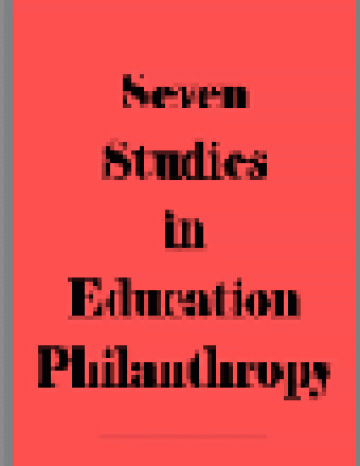
Seven Studies in Education Philanthropy
The Thomas B. Fordham Foundation asked experts to share their knowledge and ideas on topics related to effective education philanthropy. Here are seven papers that answer some of philanthropists' most important questions in the education reform arena.
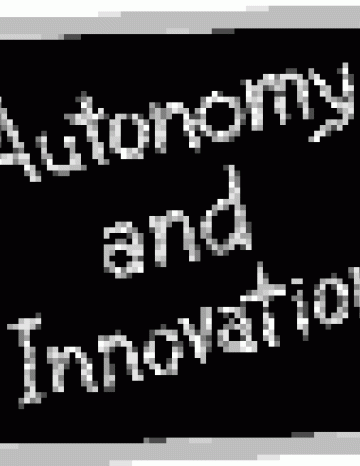
Autonomy and Innovation: How Do Massachusetts Charter School Principals Use Their Freedom?
Charter schools grant significant autonomy to their principals, but do their principals make decisions that would not be possible in ordinary schools? Are they creating schools that are truly different from (and potentially better than) regular district schools? For this report, Bill Triant conducted extended interviews with eight charter school principals in Massachusetts on five dimensions of school operations (teacher hiring, budgetary control, instruction and curriculum, organizational design, and accountability) to shed light on how they use their autonomy. He finds that when charter school principals are given the opportunity to innovate, they do so.
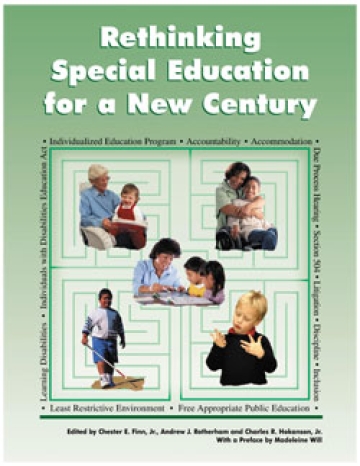
Rethinking Special Education for a New Century
Recommending sweeping changes in federal special ed policy, this new volume of 14 papers scrutinizes the education now being received by 6 million U.S. children with disabilities. Jointly published with the Progressive Policy Institute, the report will help shape discussion of the next reauthorization of the Individuals with Disabilities Education Act (IDEA). It identifies the problems that now beset this important program, analyzes their causes, and suggests solutions. All who care about the education of children with special needs will want to read it for themselves.
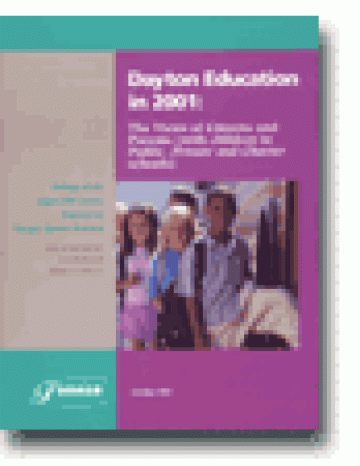
Dayton Education in 2001: The Views of Citizens and Parents
This unique survey compares the views of parents with children in private, public and charter schools on the quality of their own schools as well as a range of education reform issues. Conducted in Dayton, Ohio, home to one of the nation's fastest growing charter school programs as well as a strong private voucher program, the data show that, while public school parents are generally less satisfied with their children's present schools, the overwhelming majority of parents and non-parents support bold reform in the public school system. The survey also shows strong support among all groups for publicly funded vouchers, higher academic standards and performance pay for teachers.
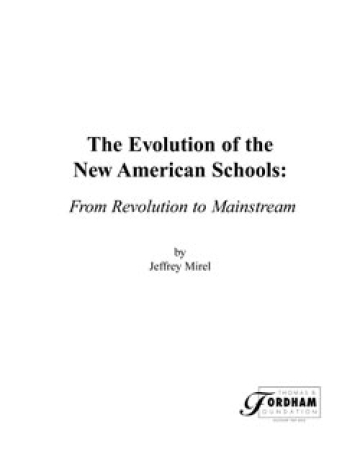
Evolution of the New American Schools: From Revolution to Mainstream
This report traces an initiative that was launched a decade ago by business and government leaders seeking to spark a transformation of K-12 education in American. The New American Schools Development Corporation (NASDC) vowed to cast aside traditional ideas about schools and apply a no-nonsense, business-savvy approach to the design and deployment of "break-the-mold" schools. Ten years later, New American Schools (as the organization is now named) looks a lot more like a member of the education establishment. Mirel's fascinating report shows how this happened.
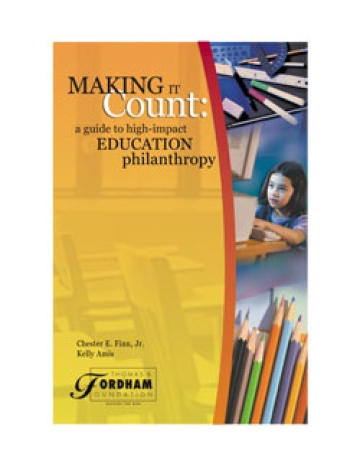
Making it Count: A Guide to High-Impact Education Philanthropy
Charitable giving in the U.S. is at an all-time high, as is the public's concern with the state of our K-12 education system. This guide provides practical advice for the philanthropist who is fed up with the status quo and eager to support effective education reforms. Making it Count reviews the state of U.S. public education, examines different ways that philanthropists are trying to improve it, explains why some strategies work better than others, profiles a number of education philanthropists, and recounts the experiences of the Thomas B. Fordham Foundation.
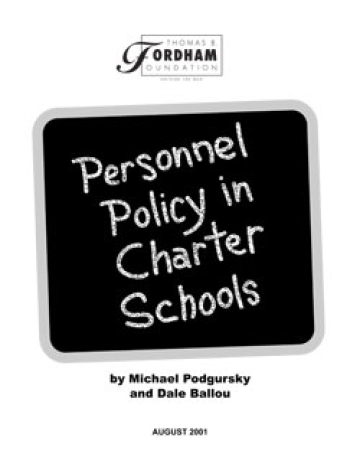
Personnel Policy in Charter Schools
When schools are held accountable for results and freed from red tape governing personnel decisions, they take advantage of their freedom by adopting innovative strategies for hiring and rewarding teachers, according to this new report by economists Michael Podgursky and Dale Ballou. This study is based on a survey administered to a random sample of 132 public charter schools that have been operating for at least three years.
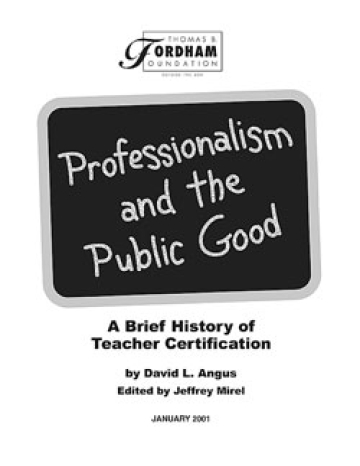
Professionalism and the Public Good: A Brief History of Teacher Certification
Why does our system of teacher certification emphasize training in pedagogy rather than subject-matter knowledge? The answer can be found in this report, which traces the emergence of state control over teacher certification. The focus is on efforts by the teacher education establishment to gain monopoly control over the licensing of teachers.
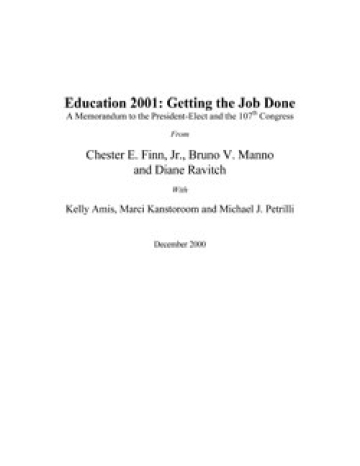
Education 2001: Getting the Job Done, A Memorandum to the President-Elect and the 107th Congress
President Bush campaigned on a strong education-reform platform, promising the American people that for the first time in a long time, commonsense?not special interest groups?would dictate federal education policy. Just before he entered the Oval Office, we handed him a briefing book on steps he could take to help transform the K-12 education system. In this "Memorandum to the President-Elect and the 107th Congress," we explained how the federal government has wasted billions of dollars on ineffective programs and offered suggestions for making continued federal funding matter.
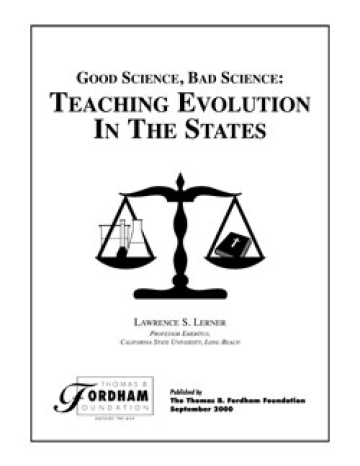
Good Science, Bad Science: Teaching Evolution in the States
More than one-third of the states get low grades for the standards they have developed for teaching evolution, according to this new report. This report is the first comprehensive analysis of how each state handles evolution in its science standards for the public schools.
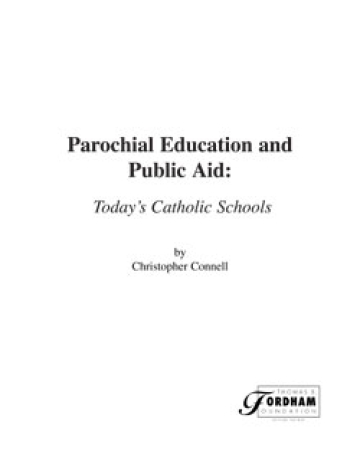
Parochial Schools and Public Aid: Today's Catholic Schools
How much government aid do parochial schools and their students actually receive? Connell finds that public aid flows to church-affiliated schools through many channels, though amounts vary greatly from state to state. This report is especially timely in light of the Supreme Court's important decision upholding government aid to religious schools.
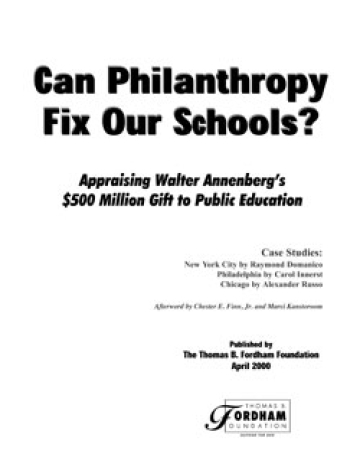
Can Philanthropy Fix Our Schools? Appraising Walter Annenberg's $500 Million Gift to Public Education
According to this new study, Ambassador Annenberg's gift has left only small footprints on the urban school systems it set out to reform. Good intentions and a generous checkbook were not enough to transform troubled urban schools. This report includes case studies of New York (by Raymond Domanico), Chicago (by Alexander Russo) and Philadelphia (by Carol Innerst) and an afterword by Chester E.Finn Jr. and Marci Kanstoroom.